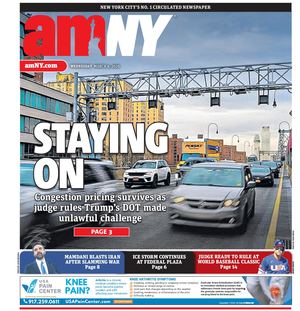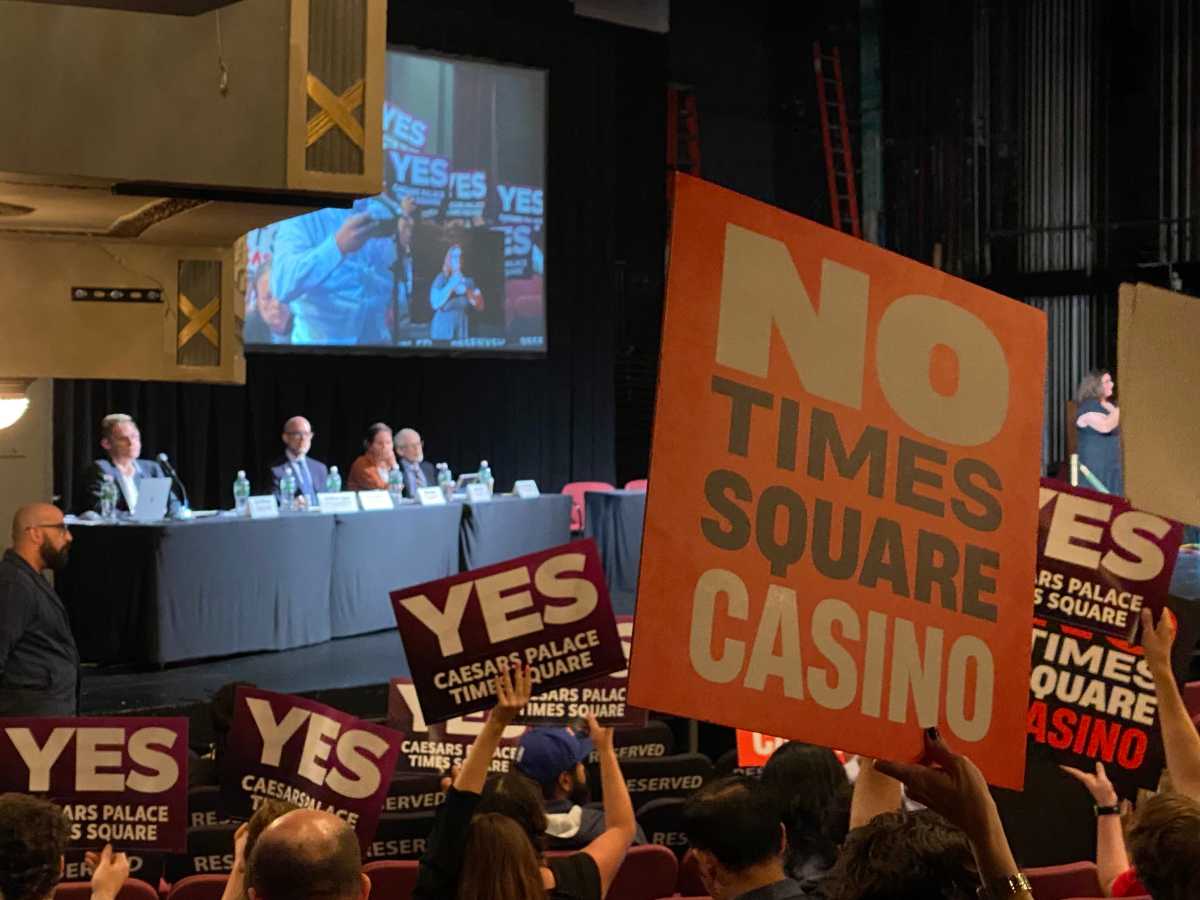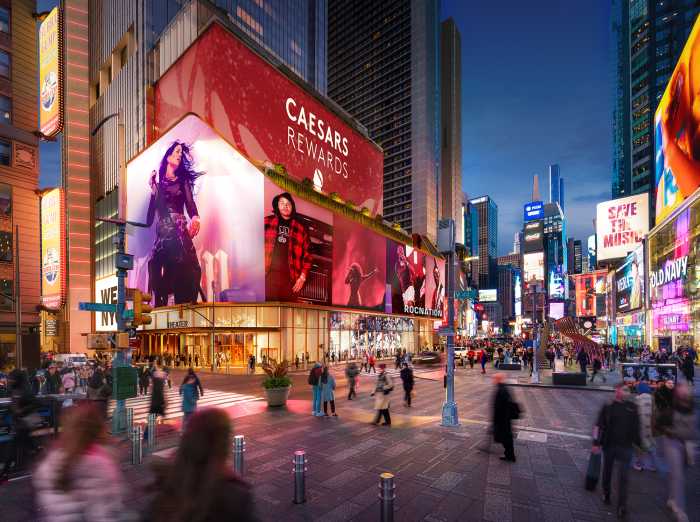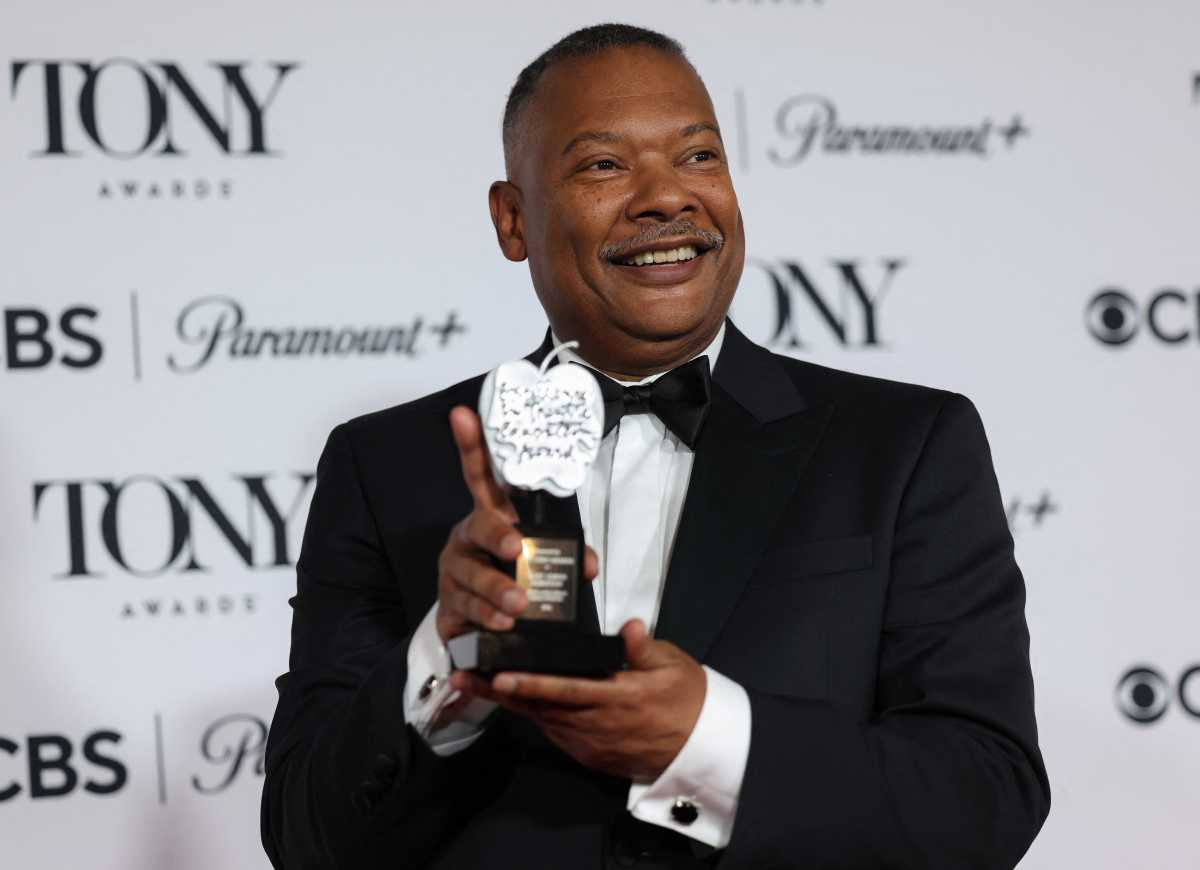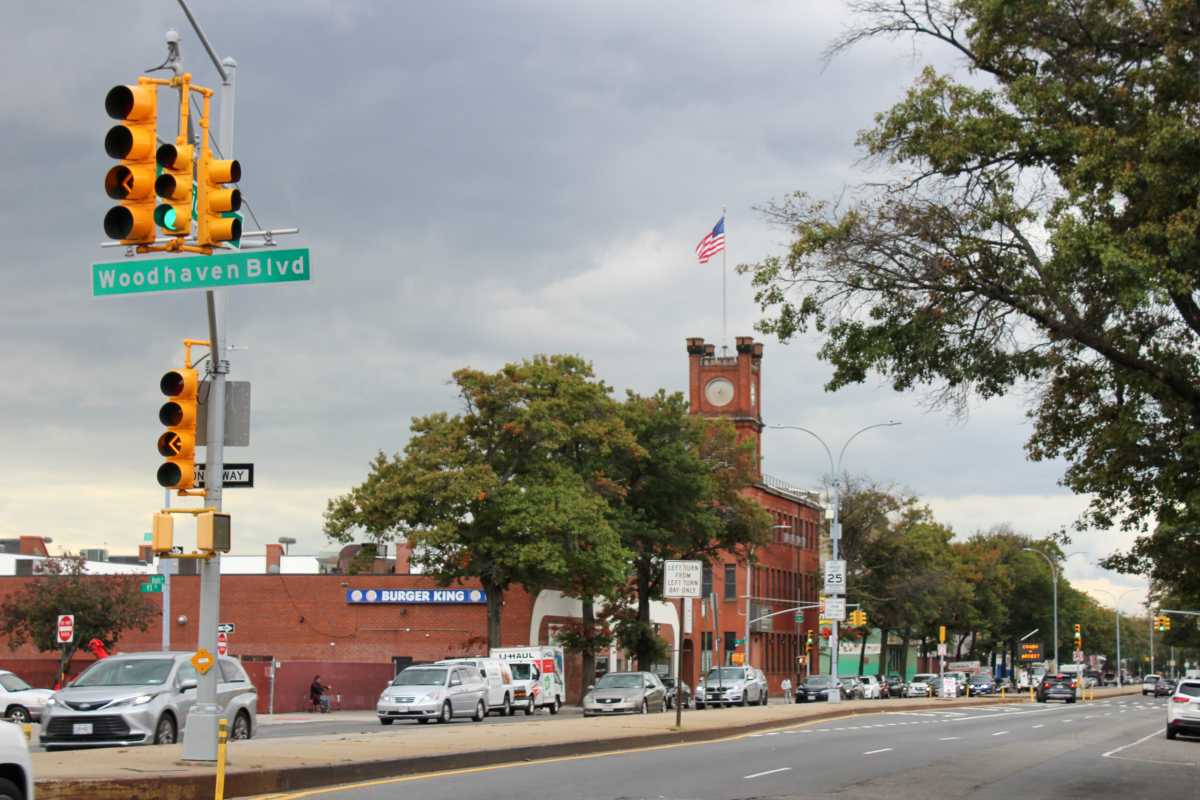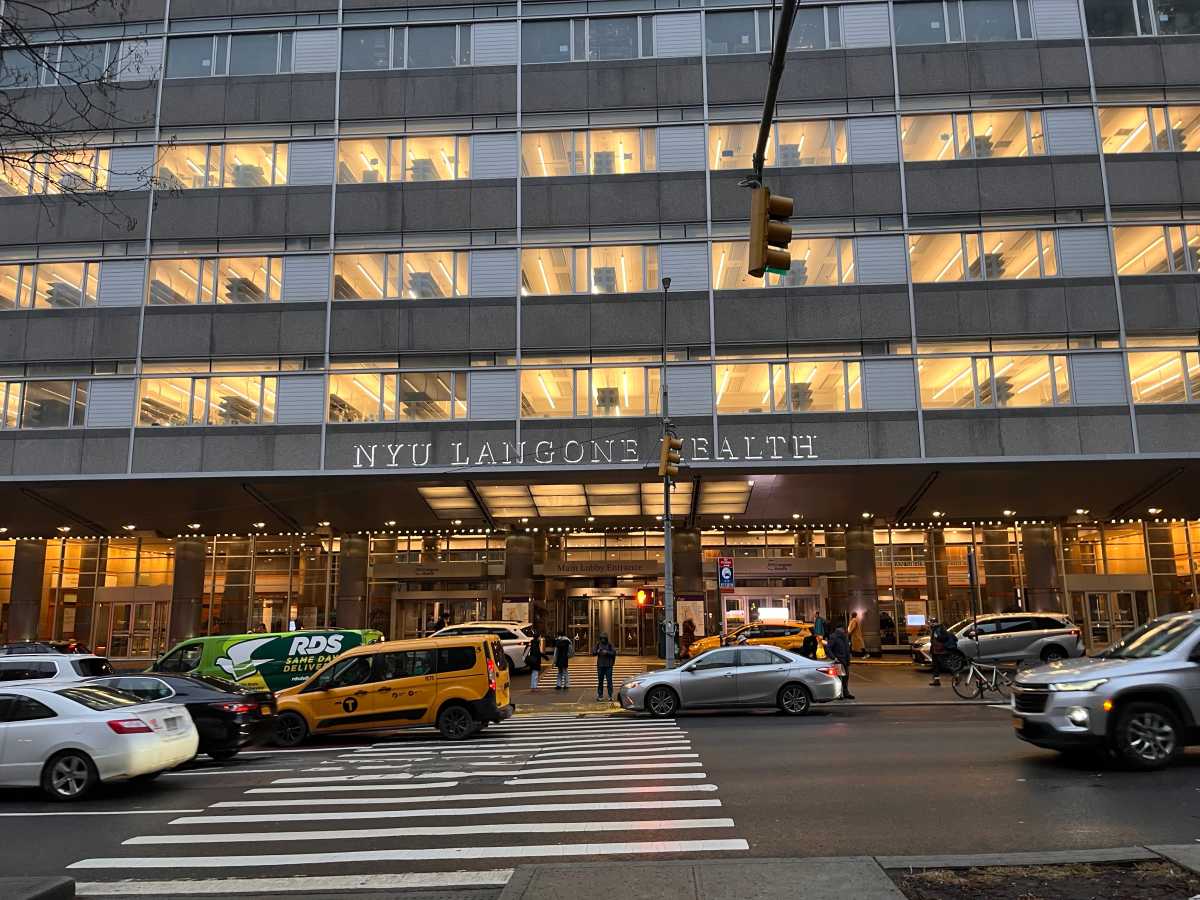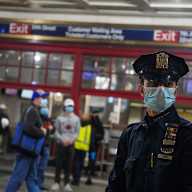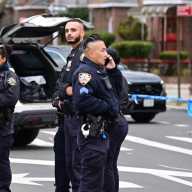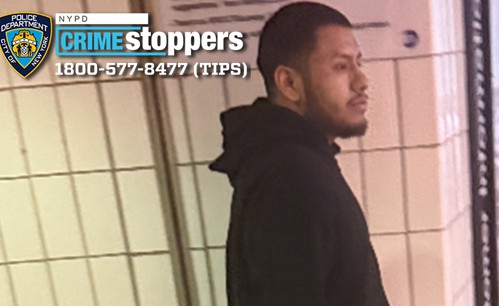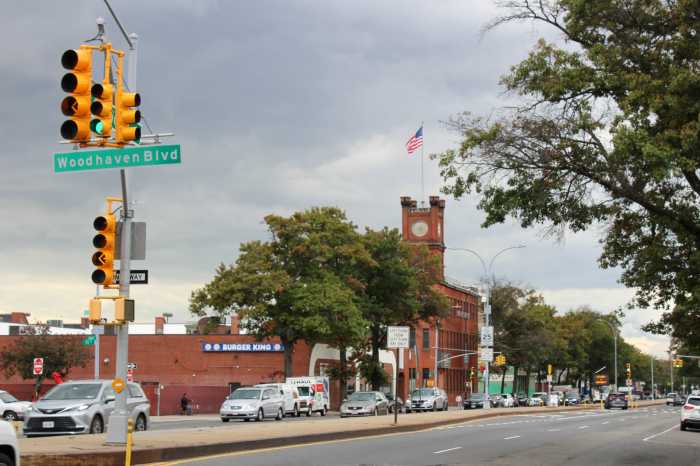As the curtain fell on the final public hearing for the Jay–Z–backed Caesars Palace Times Square casino bid Thursday night, the Community Advisory Committee tasked with advancing the proposal to the state level was left with a central quandary: Can Broadway share the stage with a gambling complex in the heart of Midtown Manhattan?
The hearing, held at the Broadhurst Theatre on West 44th Street, was filled with all the drama of the neighborhood — raucous boos, jeers, applause, and even musical testimony.
Opponents framed the $5 billion project as the proverbial switch that could dim the lights of Broadway, while supporters argued it would push Times Square into a new era with more jobs, greater tourism, and safer streets.
The plan, from SL Green Realty, Caesars Entertainment, and Jay-Z’s Roc Nation, would turn the empty office block at 1515 Broadway into a 24/7 casino and entertainment complex. The design includes 992 hotel rooms, a Caesars Sportsbook at The 40/40 Club, blending a wagering venue with Jay-Z’s nightclub brand, and restaurants led by chefs Daniel Boulud, Gordon Ramsay, Bobby Flay, and Melba Wilson.
The proposal also includes a wellness retreat and spa, as well as a newly renovated Broadway theater.
The developers also tout more than $80 million in private security, 24-hour NYPD coordination, and arts investments, including a Civil Rights Museum and support for small theaters, on top of a pledged $250 million community benefits fund.
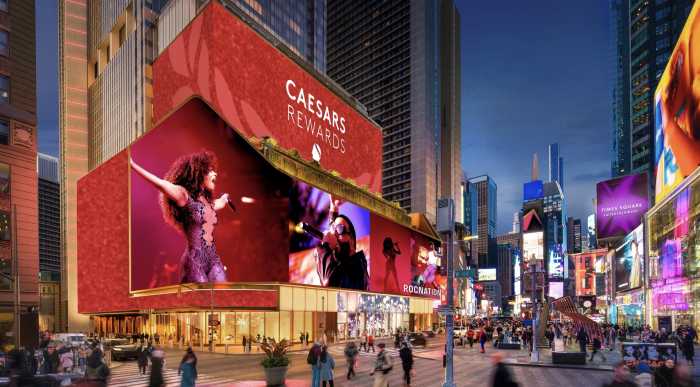
Over 500 people had signed up to speak to the CAC, and out of the nearly 200 who made it to the microphone, the majority gave it a thumbs down.
Actors, musicians, stagehands, and nearby residents lined up to oppose the casino, warning it would siphon audiences and dollars from Broadway, worsen traffic, and prey on vulnerable seniors.
“We already have a jackpot in Times Square. It’s called the theater district,” Ben Simpson, a Broadway worker and local resident, said.
Supporters, led largely by union workers, small business owners, and some cultural leaders, countered that the casino would deliver thousands of union jobs, attract more than a million additional hotel stays annually, and diversify ownership in Times Square.
“This is an investment in the future of Times Square, the future of New York City, and just making it stronger for everyone who lives, works, and visits here,” Midtown worker and Hell’s Kitchen resident, Ava, said.
‘Jay Z is nobody’s token’
Before public testimony, SL Green CEO Mark Holliday called the project “a labor of love,” five years in the making, and urged the committee to advance it. “You hold the key to the future of Times Square and New York City for generations to come,” Holliday said.
He stressed that the project would not displace housing because the site is an office building. Holliday also accused the Broadway League of mounting an “underhanded smear campaign” funded by “a wealthy, multi-generational theater owner, protecting its own interests at the expense of the community.”
Outside the theater, LED billboards flashed messages such as “NO Crime, NO Chaos, NO Casino,” while opponents donned red T-shirts from the No Times Square Casino Coalition.
The Broadway League, a member of the 35-strong coalition, stood alongside unions including IATSE, the United Federation of Teachers, social service providers, and neighborhood associations.
Inside, Broadway League president Jason Laks rebutted Holliday’s claims, saying the developers had participated in their own smear campaign against the coalition by placing a full-page ad in the Sept. 11 edition of the New York Post before attacking the project’s job creation numbers.
“Out of eight casino bids, that’s dead last,” Laks said. “Asking theaters and theater workers who have built back New York City tourism…to risk their livelihoods for a casino that comes in dead last and job creation is a slap in the face.”
“We represent 100,000 New Yorkers who work in our industry. New York City can do better. The neighborhood deserves better. Please protect Broadway and its workers and vote down this casino,” he added.
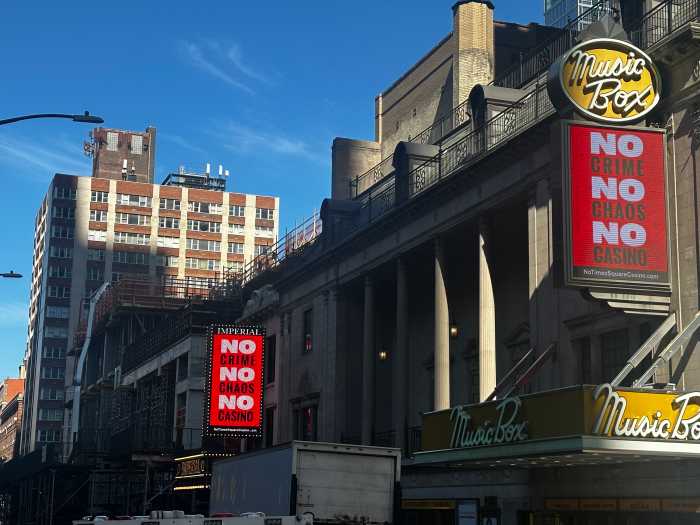
Prominent civil rights leader Rev. Al Sharpton, who first backed the bid in June, joined developers on stage to emphasize the proposal’s equity and inclusion aspect. Developers are offering $500 ownership stakes under the “inclusive ownership” model, which would allow low-income local households to invest in large-scale real estate.
“As we deal with the question of diversity, equity, and inclusion with Trump, we don’t have DEI right here on Broadway,” Sharpton said. “So, if this casino is established, it will be the first time we will have an institution on Broadway that has diversity at an ownership level, and you’re not just giving a token. Jay Z is nobody’s token.”
Sharpton’s comments drew rebuttals later in the hearing. Resident Lorna Pruce said she agreed with Sharpton on diversity but opposed placing a casino in Times Square. “We’re talking about Times Square. We’re not talking about Jay Z buying a theater.”
“I really, truly feel that a casino in Times Square is akin to colonizers coming in and destroying the culture,” she said.
Encouraging a civil discourse ahead of the public testimony, Rev. Sharpton evoked the recent shooting of conservative activist Charlie Kirk, saying, “We need to try to not deal with just emotions, but deal with what’s rational.”
Patricia White, president of Theatrical Wardrobe Union 764 of the IATSC, said that Rev. Sharpton’s request that participants not deal with emotion “is really asking you to ignore what’s special and fragile about this neighborhood that can’t be found anywhere else.”
“They can see the inherent excitement of Times Square, the lights, the people. A casino threatens to overwhelm this unique neighborhood character,” White said. “There are plenty of empty lots in the city. There’ll be jobs there, go there.”
Union vs. Union
Across the eight bids for the downstate licenses, the promise of union jobs, both permanent and temporary, has drawn vocal support from workers at each of the bids’ public hearings.
But the Broadway workers showed up in force and stressed to their unionized brothers and sisters that this project was a risk to their livelihoods.
Mike Helmstrom, member of Local 79 and representative of the Mason Tenders District Council, said that while the discussions are happening across the five boroughs, “this Caesar proposal is the best, well-thought-out proposal that’s been put before any community of people.”
“It is the only shovel-ready project…there is going to be very little approval that Caesars will need once they make it through this process and get up to Albany, where this decision really should be made. This decision should be made on an Albany level.”
He was followed by Edward Pierce, president of IATSE local, USA, 829, United Scenic Artists, who said his 5,000 members support building trades and hotel workers but that “those jobs will materialize wherever this casino is built.”
“Our jobs are on Broadway, and we don’t have the option of moving our theaters. Please preserve our crown jewel of New York City, Broadway,” said Pierce.
Leah Oken, live Events business representative for the Theatrical Wardrobe Union, Local 764 of the IATSE, warned the CAC that opening a casino would compromise Broadway as NYC’s economic driver.
“Make sure that the bright light shines for generations in this big city. If a casino is built in Times Square, I fear the bright lights will be dimmed and we will lose our way in the dark,” said Oken.
Tony-nominated actress Veanne Cox spoke as both a Hell’s Kitchen resident and member of the Broadway community for the last forty years, remembering the important role Broadway played in the aftermath of 9/11.
“I was in a show on 43rd St. when 9/11 happened. We opened back up three days later, and the audience breathed together, and we cried together, and we left the theater feeling bigger than what we had been made to feel that day, three days prior,” said Cox. “That is what the theater does. It brings people together for a shared experience, for something of the mind and something of the heart and something of the soul. I don’t know about gambling, but I do know that a casino is about every man for himself.”
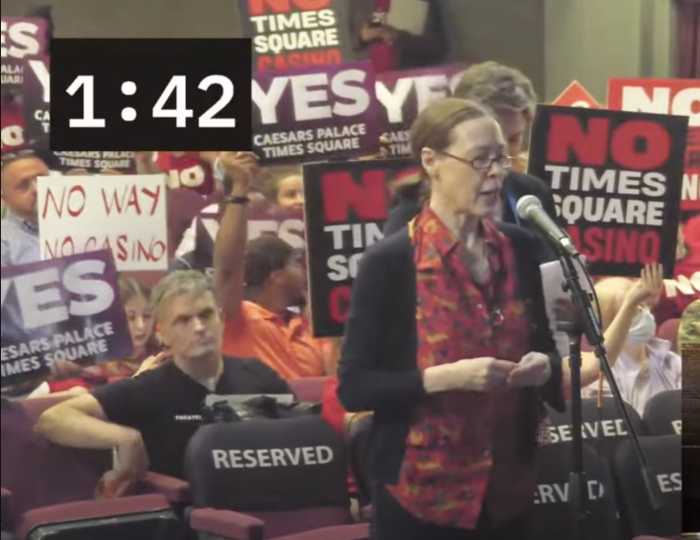
“I am afraid. I am afraid for my livelihood. I am a union member. I am a middle-class income worker in Times Square, and I live here. I am afraid for my fellow artists. I am afraid to see our lives and our light that we have offered the world and we have defined Times Square for 125 years,” Cox concluded.
Liz Keefe, a resident of Manhattan Plaza who also ran an off-Broadway theater company on the corner of 46th Street and Seventh Avenue, told the CAC to approve a casino in a place “that needs an economic boost” and that a casino in any other place will still create union jobs.
“Putting a casino in what is perhaps the most congested area of Manhattan is a ludicrous idea. The millions of dollars that they have promised this neighborhood cannot take away the congestion, even with congestion pricing, the street infrastructure is still can barely accommodate the current pedestrian, bike, and car traffic, and so we, the people that actually live here, will bear the brunt of that chaos that it will create.”
Actors’ Equity Association, the union representing actors and stage managers, and the local branch of the American Federation of Musicians have backed the bid.
Harvey Morris, the in-house counsel for the Local 802 branch of AFM, spoke in favor of the bid, calling it “a win-win in any respect.”
“This is not just a casino. It is an entertainment facility, one casino, one license. [It] is not going to destroy Broadway, not in a million years. And I hear fear and loathing about one casino. There’s a Dave and Busters around the corner. Did that destroy Broadway? I mean, it’s one step from being a casino,” he said.
“This is going to revitalize the community, not destroy the community,” Morris added.
Blue Man Group sees green
Not all cultural voices opposed the bid. Matt Goldman, co-founder of Blue Man Group and executive director of Town Hall, said his experience in Las Vegas shows casinos boost theater audiences. He said, “More tourism, more gaming folks doing gaming, brings more people to the restaurants, brings more people to the theater.”
“It’s just a misnomer that if people are in a casino, they’re not going to go out and eat and take in entertainment. And I also think that the fact of a casino is going to draw so many more people into Times Square that the spillover effect will benefit everyone,” he added.
Speaking to amNewYork after his testimony, Goldman said while he didn’t want to invalidate people’s fears, “The evidence and the facts don’t really support that bringing in a single casino that will likely bring in a completely different kind of tourism will reduce the number of people going to theaters.”
“We have experienced firsthand at Blue Man Group that the more people who like gaming, the more your theater is filled with ticket buyers, and it’s just a numbers game, and people cannot gamble 24/7,” he said.
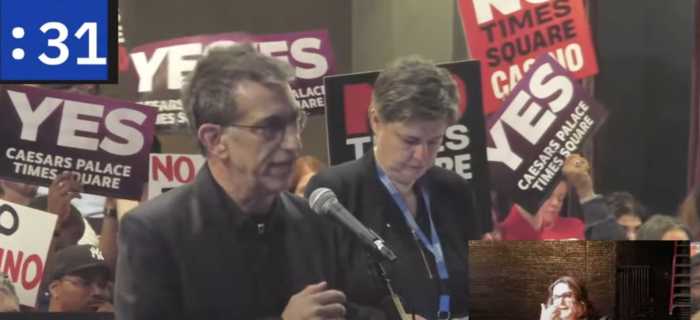
Danny Whitman, executive director of Broadway Cares/Equity Fights AIDS, disagreed with Goldman’s assertion, saying that every casino’s business model is to keep people inside.
“They want people to eat at their restaurants, stay in their hotel, and see their abbreviated 80-minute shows, the second they lose is when people leave their building,” he told amNewYork. “Broadway is the number one or two reason that people travel to New York, which is why it’s not worth the gamble.”
The interview followed Whitman’s rousing testimony that brought many opponents of the casino to their feet: “Last year, Broadway added $15 billion to the economy, but Broadway runs on tight margins. Change the equation and the shows close. This is the only casino proposal that risks cannibalizing an existing, thriving industry.”
SL Green managing director Brett Herschenfeld later told amNewYork the casino is “designed to be intentionally small” and would funnel visitors to Broadway theaters, hotels, and restaurants. “People have to eat and they have to sleep and they want to see shows and they want to shop,” he said.
He said the project would promote Broadway shows in hotel rooms and support minority productions. Acknowledging that casinos elsewhere are massive, Herschenfeld said, “This project is intentionally a very small footprint. So people must go out.”
On the topic of congestion, which was a repeated theme throughout the night, he argued the Times Square location would create “the least incremental congestion” due to mass transit access, adding that SL Green has partnered with Uber to manage drop-offs.
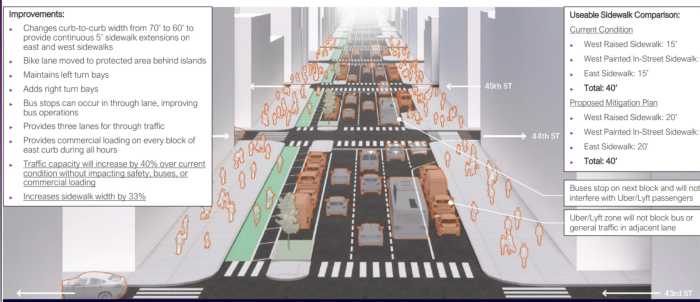
The developers’ traffic plan estimates that three-quarters of visitors would arrive by mass transit or on foot, but also calls for eliminating a bus lane and reducing the widened “super sidewalks” installed in 2022.
Many remain unconvinced. Helen Toth, a Hell’s Kitchen resident and wheelchair user, urged the committee to reject the bid. “Adding to the volume of people that a casino will bring is grossly out of touch with the reality of this location,” she said.
“This already is a tough and expensive neighborhood to manage. We cannot afford more stress or compromise on those expenses,” Toth added.
